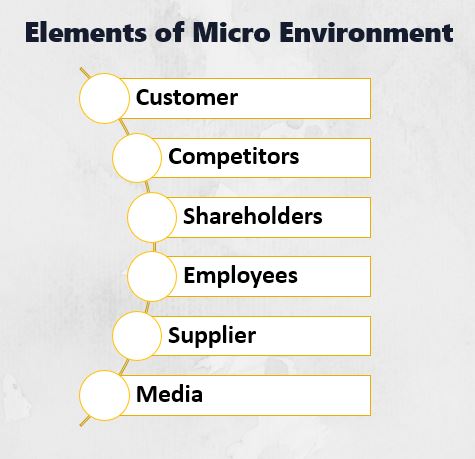Meaning of Micro Environment
Micro Environment refers to an environment existing within the organization and can directly regulate its business activities. This environment is simply a composition of all those factors which are under the control of management. Micro environment is also termed as task environment or operating environment. It does not influence the whole industry but only affects those companies with which it is closely associated. Micro environment is connected to a small area in which firm operates and include forces that are close to firm. It is must for every business enterprise to exercise healthy coordination among these internal factors which will ensure the business health.
Competitors, customers, shareholders, media, suppliers and employees are all those controlling parameters for business which are covered under the micro environment. Nature of relationship existing in between these parameters directly decides the success or failure of any business enterprise.

Elements of Micro Environment
The elements of micro environment are as discussed below: –
- Customer: The customer is regarded as the king of every business enterprise. Every firm makes tremendous efforts in order to keep their customer happy and fulfill their needs. A successful business organization is one that is able to satisfy its customer wants via providing its range of goods or services. It is a must for businesses to analyze effectively what their customers expect from them in order to provide them full satisfaction.
No business can survive in the long run if it is not able to win its customers. Therefore, the main focus of every business should be on creating and retaining customers for the long term.
- Competitors: Competitors means the rival sellers of companies operating in the same industry. The actions of competitors are one which keeps the firm thriving. The market of firm product and services are highly influenced by nature and degree of competition existing in the market. Every business whether small or big has its competitors which makes it necessary for a business to keep a check over its actions.
In order to face the competition effectively, a firm must ensure that their products have USP which imparts them uniqueness in the market. Also, the goods offered by the business should be better and of cheaper prices.
- Shareholders: Shareholders are the real owner of the company who injects their money into a company’s operation for making profits. They purchase the shares of the company for which they dividend each year in the form of return.
It is the duty of every business enterprise to earn sufficient profits and pass on the same to their shareholders. The company must strive for enhancing the overall wealth of its shareholders. Therefore, a business must maintain right balance in between the health of its operations and shareholder benefits. - Employees: Employees are the key factor of production for every business enterprise. The presence of right human resources plays an effective role in deciding the success or failure of the firm. Therefore, hiring and retaining the right people is of most importance for business success.
Regular training and development of human resources enable firm in keep its workforce up to date. No organization can succeed if due care is not taken in this regard, as employees are their backbone.
- Supplier: Suppliers are the person who supplies raw material and other essential factors of production to a company. As they provide firm with required inputs, the continuity of manufacturing activities is directly influenced by suppliers. The relation between a business and its supplier is called power equation as both of them are dependent on each other for their survival.
A company must always ensure healthy and durable relations with its suppliers for ensuring smooth functioning. In case, if the company falls short of any one raw material, then it may eventually delay the whole production process.
- Media: A media is a source that reflects a brand image and message in the market. The power of media is well-known that can break the whole organization overnight. It is much needed for every company to manage its media relations be it press media, electronic media or social media. Media plays a great role in developing a clean as well as a positive image of brand among customer minds. A company can get maximum benefits if it makes use of media in right manner.
Huge losses may be incurred by the company if in case any negative coverage regarding the brand comes up in the media. It is due to this reason that PR managers are hired by companies for making an effect in media.